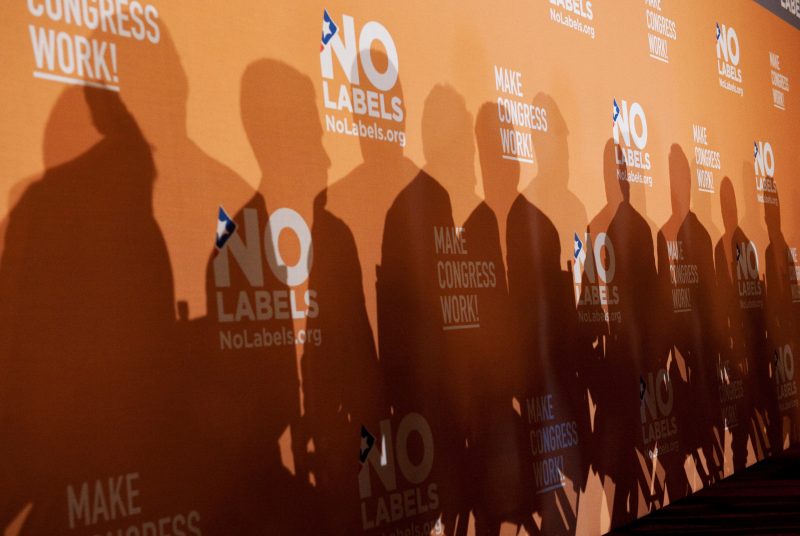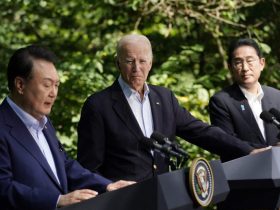The third-party group No Labels is hosting events Monday in New Hampshire to unveil its policy agenda ahead of a 2024 presidential race in which Democrats fear it could serve as a spoiler to help Donald Trump.
Leading the announcement are two men who just happen to make sense as the group’s bipartisan 2024 ticket: Sen. Joe Manchin (D-W.Va.) and former Utah governor Jon Huntsman (R).
But what would the most formidable No Labels ticket look like?
The group insists it’s not thinking that far ahead right now. It has taken pains to say that it won’t press forward if it’s looking like its ticket would merely play a spoiler role. The ticket featuring a Democrat and a Republican would be named in April, it says, only if there is a viable path. That seems unlikely no matter how few Americans say they want Trump and President Biden as the nominees right now.
But let’s say we get to that point, and the ticket is a go. Who could actually pull significant support, particularly at the top of that ticket? And who might be interested in running?
Given the consternation in the Democratic Party over all of this, it would seem to make the most sense for No Labels to pick a Republican to lead the ticket — or at least someone who would pull significant votes from that side — thus insulating itself (rhetorically, at least) from the idea that it’s playing the spoiler role.
Two GOP names probably jump to the top of the list.
One would be former Maryland governor Larry Hogan, who has worked with the group and spent much of his eight years running a blue state with sterling approval numbers. In his final months in office, a Washington Post-University of Maryland poll showed at least 70 percent of Republicans, Democrats and independents in Maryland approved of his job performance.
(Another recent former Republican governor of a blue state, Massachusetts’s Charlie Baker, often rivaled Hogan’s numbers, but Baker recently became president of the NCAA.)
The other Republican would be New Hampshire Gov. Chris Sununu, who also has proven bipartisan support in his home state and was one of the GOP’s biggest winners in the 2022 election. Sununu recently passed on a GOP presidential campaign, but he also seemed to enjoy building his national profile. And he’s said he’s unlikely to run for a fifth two-year term as governor.
Notably, Sununu said nice things about No Labels in a big New York Times piece this weekend ahead of the group’s events in his state, saying it “seems to be tapping into what America is looking for right now.” The conservative Wall Street Journal editorial board has also pitched Sununu for this role.
The third big name that makes the most sense is a Democrat, Manchin. Perhaps no name in national politics has more of a reputation as someone who spans the ideological spectrum, repeatedly proving the decisive vote for or against the Democratic agenda in a closely divided Senate. And arguably nobody has leaned in to a potential No Labels run more than Manchin.
Manchin also faces a potentially arduous reelection campaign against Gov. Jim Justice (R) or another Republican in ruby-red West Virginia in 2024 — he has yet to announce his plans — making an alternative course seemingly attractive.
This option could also be one No Labels could sell as less likely to play the spoiler role. Despite Manchin’s being a Democrat, he’s generally more well-liked among Republicans, raising the prospect that he could at least draw evenly from the two parties.
Other potential candidates have lower national profiles and/or less involvement with No Labels, but could make sense.
Huntsman is obviously one. The former Utah governor ran for the GOP nomination in 2012, dropping out after being an also-ran in Iowa but placing third with 17 percent in New Hampshire. He later served as Trump’s ambassador to Russia, ultimately sharply criticizing Trump after Jan. 6, 2021. He’s also, like Hogan and Sununu, a very popular former governor; his approval rating once registered at 90 percent. But he attempted a political comeback in 2020 and wasn’t able to win the GOP nomination for his former job.
Another choice that makes lots of theoretical sense, at least, is Sen. Kyrsten Sinema (Ariz.). Sinema left the Democratic Party last year after joining Manchin to give her party fits, becoming an independent. She has not said whether she’ll seek reelection, but her path to victory in Arizona appears limited. A national poll late last year showed she is popular among independents who know her — 42 percent favorable to 27 percent unfavorable — and, like Manchin, more popular among Republicans than Democrats.
A couple other Republicans would be Sens. Bill Cassidy (R-La.) and Susan Collins (R-Maine), who both have ties to the group and both voted to convict Trump at his second impeachment trial in early 2021.
Cassidy has little in the way of a national profile, but he isn’t up for reelection until 2026, and he passed on a gubernatorial campaign this year.
And the impeachment vote notwithstanding, Collins would seem somewhat unlikely, given her lack of interest in the national spotlight and the distaste she has engendered among Democrats for other votes. A YouGov poll last year showed her numbers underwater among each of national Republicans (20 percent favorable to 32 percent unfavorable), Democrats (23-38) and independents (11-35).
And if you’re getting beyond Hunstman or Sinema, it’s difficult to see anyone having the kind of heft you need on the national stage to make a big difference.
Former congressman Fred Upton (R-Mich.) and former North Carolina governor Pat McCrory (R) have ties to the group and were slated to be there Monday.
Some have floated former Trump secretary of state Mike Pompeo, who passed on a 2024 GOP bid, has upped his criticisms of Trump lately and reportedly met with the group late last year. But Pompeo hardly cuts the moderate figure of a No Labels-type candidate, having allied much more with the right wing of the Republican Party.
And then we get into the kinds of candidates No Labels would run in an ideal world — someone like former congresswoman Liz Cheney (R-Wyo.) or Sen. Mitt Romney (R-Utah), who have conservative records but have strongly broken with Trumpism. Neither, though, is the kind of candidate you can imagine running if it might help Trump at all by drawing votes away from Biden.
And indeed, those two spotlight perhaps the biggest question, which is who would even want the job. The prospects for success are so limited, and those with big profiles might fear that playing a spoiler would drown out any other entries in their political obituary. The most likely outcome is that we would get someone who wants to make a point — however well-advised — about bipartisanship, and is willing to risk plenty to make it.








